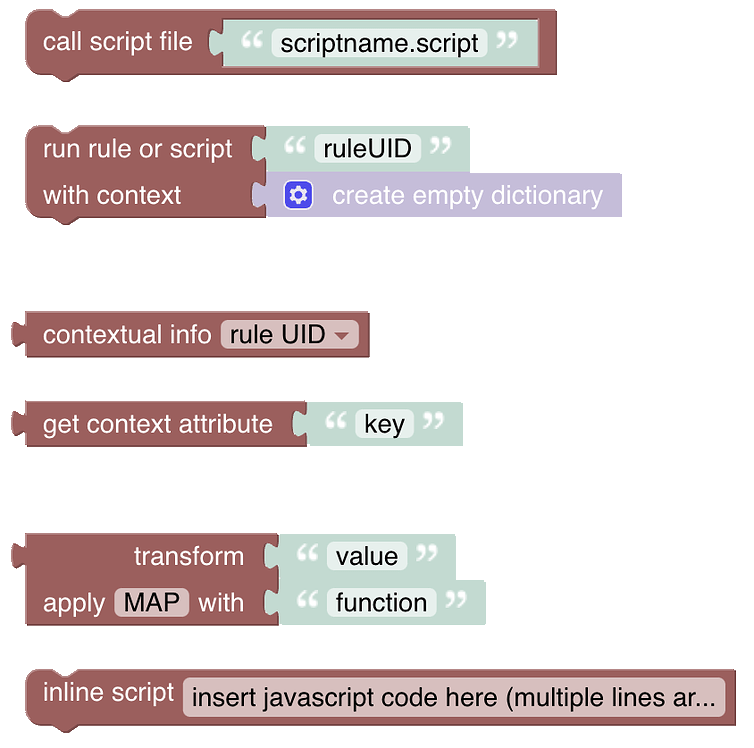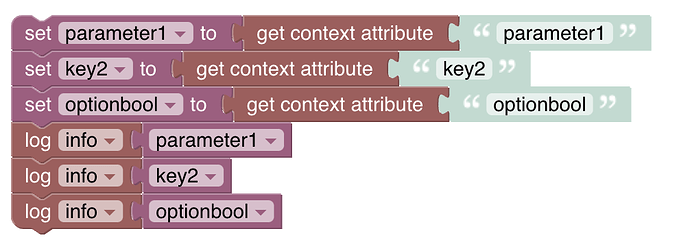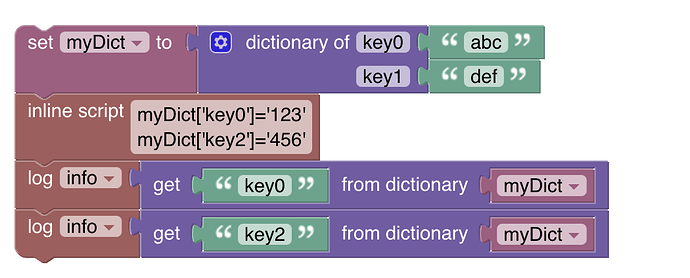6.1 KiB
| layout | title |
|---|---|
| documentation | Rules Blockly - Run & Process and Transformations |
Run & Process (Rules and Scripts)
Introduction
This section contains several possibilities
- Calling Rules or other scripts either located as files on the server or provided via the UI
- Retrieving attributes provided by the rule context or from the own caller rule.
- Transforming values via different conversion methods (map, regex, jsonpath)
A note about Rules and Scripts
A Script is a Rule too. It’s just a special type of rule that only has a single script action and a “Script” tag.
{::options toc_levels="2..4"/}
- TOC {:toc}
{: #blockly-value-storage-overview}
Overview of the Run & Process blocks
Run & Process Blocks
See also the short video part about  Run & Process blocks, transform
Run & Process blocks, transform
Call Script File
Function: Calls a script file with the given name which must be located in the $OPENHAB_CONF/scripts/ folder.
- No parameters can be provided
See openHAB Call-Script for background information
Run Rule or Script created in UI
Function: calls another rule or script that was created via the openHAB UI.
The ruleUID can be found in the list of rules or scripts in the second line of the list (like here helloBlockly or helloWorld)

Parameters are optional:
- If not providing parameters leave the with context section as is.
- If providing parameters you must replace the create empty dictionary block with the dictionary block from the Lists section, modifying the number of key/value pairs to suit.
Notes:
- parameters can be retrieved in the called script via the "get context attribute"-block (see below)
- the called rule / script cannot return any value
- it is not possible to access a particular function in another script or rule as scripts / rules have to be perceived as completely autonomous
- the called rule / script is run synchronously
Retrieve context attribute from rule
Function: Retrieve context attributes passed by a calling rule/script (see above)
This retrieves the value for the key "myKey1" that was passed by the calling rule.
Example
Retrieve rule context information
Function: Retrieve event context related information of the rule
A rule carries contextual information when triggered - this block can retrieve that information.
- The rule trigger type defines which of the attributes are available to the rule - they will not all be available.
- For more detailed information see Event Object Attributes or openHAB Events.
Transform values via Map, Regex or JsonPath and others
OpenHAB provides many transformations:
The following describes examples for Map, Regex, and JsonPath
Function: Transform the given value via one of the different transformation methods
Example 1: Regex
Convert #123456 into rgb(12,34,56)
Example 2: JsonPath transformation
Extract the temperature from the following JSON
{ "device": { "location": "Outside", "status": { "temperature": 23.2 }}}
by using the jsonpath
$.device.status.temperature
Example 3: Map transformation
This example applies a map transformation from the map file nanoleaf.map in $OPENHAB-CONF/transform/
The above, with the below map file
ON=Ja
OFF=Nein
effects=Effekte
-=?
NULL=n/a
hs = Hue/Saturation
ct = Color Temperature
would result in the following log entry
Hue/Saturation
Inline Script
Function: execute arbitrary ECMAScript content
Provides the possibility to inject any ECMAScript at a given position. This should be used in cases when Blockly does not provide the desired functionality. Use with diligence.
Example
See also the short video part about  Inline Scripts
Inline Scripts













